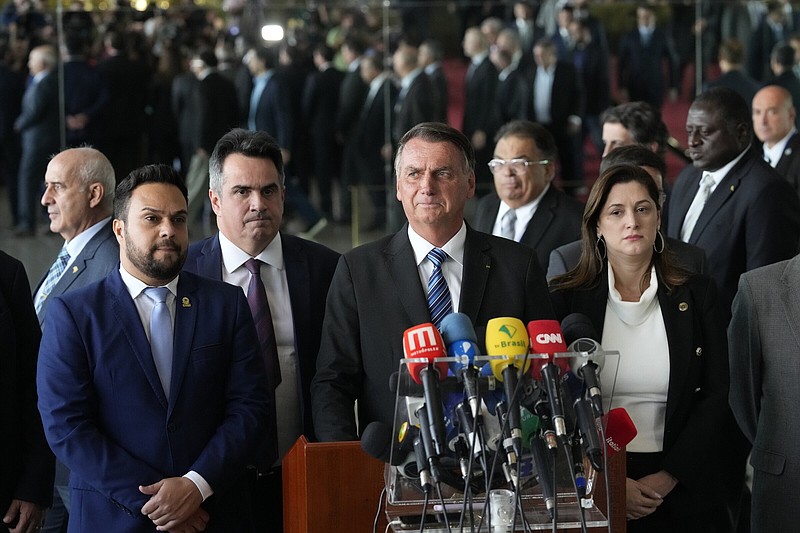BRASILIA, Brazil -- Two days after losing Brazil's presidential election, President Jair Bolsonaro agreed to a transition of power Tuesday, easing fears that the far-right leader would contest the results after warning for months that the only way he would lose would be if the vote was stolen.
However, Bolsonaro did not concede the loss in his own words. After Bolsonaro's brief public address that criticized the left, the president's chief of staff said the government would hand over power to the incoming administration.
"President Bolsonaro has authorized me -- when requested, based on the law -- to start the transition process," Bolsonaro's chief of staff, Ciro Nogueira, said in a brief comment after the president's speech.
Bolsonaro thanked his supporters but did not address his loss. "I was always labeled undemocratic," he said. "Unlike my accusers, I played within the limits of the constitution."
Since his election loss Sunday, thousands of his supporters have blocked hundreds of highways across Brazil in a bid to "paralyze" the country and somehow overturn the election. Bolsonaro said those protests "are the fruit of the indignation and feelings of injustice in the electoral process," he said.
But he urged his supporters to halt disruptions. "Peaceful demonstrations will always be welcome," he said. "But our methods cannot be those of the left, like property invasion, destruction of goods and restrictions on the right to come and go."
His decision to transfer power was welcome news for Brazil's democracy. The president has long attacked Brazil's election system as rife with fraud, despite a lack of evidence, and before Sunday's election, he had suggested that the left was trying to rig the vote.
So when the talkative politician suddenly went silent for two days, the nation was kept on edge, wondering if he would dispute his loss.
Now, Brazil's government can fully begin working toward a transition to President-elect Luiz Inacio Lula da Silva, the leftist former president who is returning to lead Brazil 12 years after his first administration. During his time out of office, da Silva served 17 months in prison on corruption charges that were later thrown out.
Bolsonaro did not mention da Silva on Tuesday.
One of da Silva's primary challenges as president will be dealing with Brazil's deep division. Bolsonaro received 58.2 million votes, or 49.1%, the closest presidential contest in the 34 years of Brazil's modern democracy.
Many of Bolsonaro's supporters consider da Silva a criminal and many have lost faith in the integrity of Brazil's elections -- both views stoked by the far-right leader.
That radicalization was illustrated by the unrest across Brazil. As of Tuesday afternoon, Bolsonaro's supporters had set up 227 active blockades of roads in 22 of Brazil's 27 states, according to the federal highway police. The police said they had cleared 330 other blockades since the election ended.
OMISSION AND INERTIA
Earlier Tuesday, Brazil's Supreme Court ordered the federal highway police to immediately clear the roads.
A majority of the court's justices backed the decision, which accuses the highway police of "omission and inertia." Failure to comply will mean its director can be fined up to more than $19,000 per hour, be removed from his duties and even face arrest. Federal prosecutors in Sao Paulo and Goias states said they had opened investigations into the blockades.
"There is no doubt that, even though he might not be directly responsible for these actions, everything he has done as president stoked this, especially questioning the electoral process and the ballots," said Williams Gonçalves, a political science professor at the Federal University of Rio de Janeiro.
"Bolsonaro is completely isolated. Everyone responsible for other institutions has already recognized the election's results," Goncalves said.
Information for this article was contributed by Jack Nicas and Andre Spigariol of The New York Times and by Diane Jeantet and Carla Bridi of The Associated Press.
Gallery: Photos of Brazillian election
